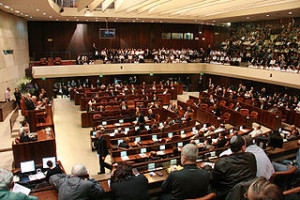World news
Public opinion in Israel

Since Israel us supposed to be a democracy, public opinion should influence the policies of Israeli Governments and Prime Ministers. But first let’s clarify this concept of “Public Opinion.”
The four types of public opinion
There are four types of public opinion. The first is “media-generated.” It is usually temporary and doesn’t require much thought or discussion. People read a newspaper or watch a talk-show and come away with “opinions.”
A second type of Public Opinion is “party-generated.” This type is manifested during election campaigns, when diverse political parties discuss various issues and offer the electorate alternative public policies. Although these policies are usually stated in general terms, those of the winning party may be said to approximate public opinion. (Unfortunately, this does not apply very well to Israel as a consequence of its system of multi-party-cabinet government. You never quite know which parties are going to make up the cabinet.)
A third type of Public Opinion is “government-generated.” It emerges from the kind of public inquiry and discussion occurring in legislative committees and assemblies, executive agencies, and judicial bodies. This type of public opinion is embodied in public law and may be said to reflect the deliberate sense of the community. It is subject to change, but not as rapidly or as readily as media-generated or party-generated opinion.
A fourth type of Public Opinion is “tradition-generated.” It consists of a nation’s basic beliefs and values, which are more or less unquestioned.
Examples of public opinion and government opinion in conflict
Obviously, a nation cannot long endure or retain its identity if its government-generated opinions are in conflict with its tradition-generated opinions. But this means that a Government may be at war with its nation’s heritage. This is the case in Israel today, as I shall now show by four examples.
Example 1. Basic Law: The Knesset prescribes: “A list of candidates will not take part in the elections to the Knesset nor shall an individual person be a candidate for the Knesset if the goals or deeds of the list or the deeds of the person explicitly or implicitly support the armed struggle of an enemy state or terrorist organization against the State of Israel.”
The evidence is overwhelming that former as well as present Arab MKs, such as Azmi Bishara and Ahmed Tibi, have supported the PLO and its armed struggle against the State of Israel. Nevertheless, contrary to both law and public opinion, the Supreme Court reversed the decision of the Knesset’s Central Election Committee to disqualify these two Arab Knesset members from participating in the 2003 elections.
Example 2. In professional polls conducted shortly before the June 1992 elections – the elections that brought the Labor Government of Yitzhak Rabin to power – 55% of Israel’s Jewish population (excluding the 150,000 Jewish residents of Judea, Samaria, and Gaza) believed that these areas ought to “remain under Israeli rule, even if this meant hindering the peace process.” Only 33% favored Labor’s policy of “land for peace.” Consistent therewith, Rabin promised he would not negotiate with the PLO. Once in office, however, the Rabin Government engaged in clandestine negotiations with the PLO, which led to the Oslo agreement (which Charles Krauthammer called “the greatest diplomatic blunder in history”).
Example 3. Contrary to Public Opinion, and with the support of only one-third of the Knesset, former Prime Minister Ehud Barak agreed, in the Sharm e-Sheikh Memorandum of September 4, 1999, to turn over to Yasser Arafat’s PLO 97% of Judea and Samaria, including the Old City of Jerusalem, thereby forsaking Jewish sovereignty over the Temple Mount.
Example 4. Arafat’s PLO-led Palestinian war against Israel broke out on September 29, 2000, while Mr. Barak was still Prime Minister. During the four months that followed, almost 100 Jews were murdered by Arab terrorists. Hence the national election of February 6, 2001 was a forgone conclusion: Ariel Sharon won a landslide victory, receiving an unprecedented 63% of the electoral vote. He thus had a popular mandate to put an end to the slaughter of Jews by destroying Arafat’s Palestinian terrorist network, which logically entailed abrogation of Oslo.
Instead, Sharon did not deviate in any significant way from his predecessor’s policy. He deliberately refrained from a policy of zero tolerance for Arab terrorism, in consequence of which almost 1,000 Jews were murdered under his premiership. (Quite a commentary on a Prime Minister that promised security.)
It should also be noted that Sharon, like his successor, Benjamin Netanyahu, opposed the abrogation of Oslo and willfully supported the establishment of a Palestinian state – contrary to public opinion. In a poll co-sponsored by the Zionist Organization of America, and reported in The Jerusalem Post on June 7, 2001, only 16% (against 80%) of the Jewish population supported Palestinian statehood, if this required Israel’s withdrawal to the pre-Six Day War lines and the loss of eastern Jerusalem.
Public opinion in confusion
Many other examples could be cited showing that Public Opinion in Israel has invariably been to the right of the Government on territorial as well as spiritual issues. There is but one way to make the Government more representative of Public Opinion, and that is to make Knesset members – hence those who become cabinet ministers – individually elected by, and personally accountable to, the voters in constituency or regional elections, the practice of the more than 80 democracies on this planet!
Small wonder that Public Opinion in Israel is utterly confused. One example tells the story. I‘ll cite a Dahaf poll of 9 August 2002 which can be applied today to Benjamin Netanyahu’s flip flopping on the “two state solution” to the Palestinian conflict. Bibi’s mentor was Sharon,
Asked, “Is Ariel Sharon a reliable prime minister?” — 63% of Israelis said Yes. Asked, “Do you count on Sharon to successfully lead the nation?” — 57% said Yes. Asked, “What grade do you give to the performance of Sharon as prime minister?” – 63% said “Good.”
Yet, when asked, “Does Sharon have a diplomatic program?” Only 36% said Yes, while 55% said No!
To compound this confused state of mind, asked “Does the Sharon Government know how to wipe out terrorism?” – only 36% said Yes, while 60% said No!
Finally, confronted by the question, “Since the establishment of the Sharon Government, who has been winning the struggle?” – 30% said Israel, 33% said the Palestinians, while 33% said Neither!
Surely one may conclude from the answers to these last three questions – and this applies to Netanyahu – that (1) Sharon was NOT a reliable Prime Minister; (2) he could NOT be counted upon to successfully lead the nation; and (3) his performance as Prime Minister was BAD!
To clinch the point, when asked, “Will the frequency of terror attacks change in the near future?” – 67% said it will Increase! And when asked, “Do you fear being hurt in a terror attack?” – 77% said Yes!
What can explain these paradoxical results? How could the same people have such a positive view of Sharon as a Prime Minister and yet have such a negative assessment of his record on the all-important issue of Arab terrorism? How can these same people grade Sharon’s premiership as “good” and yet anticipate an increase in terror attacks?
Perhaps because most Israelis believe that Arab terror is inevitable, and that they simply didn’t know of a politician that could do better than Sharon in preventing this terrorism.
Probing deeper, however, the people’s pessimism regarding Arab terror, and therefore, the positive view they had of Sharon, can be explained as the result of many years of brain washing. Clearly, the public in Israel has in fact been indoctrinated to believe that there is no military solution to the terrorist problem. (Yet there are military experts who reject this assessment, which borders on defeatism.
Defeatism permeated Israel’s disengagement policy. The Government’s “security fence” exhibits this defeatism, more precisely, timidity and intellectual sterility. This applies 100 percent to Netanyahu. Moreover, implied in his advocating Palestinian statehood indicates that he nurtures the delusion or escapist belief that there is enough room between the Jordan River and the Mediterranean to accommodate two states, one of which is committed to Israel’s annihilation!
Here we see that the confusion of public opinion in Israel is rooted in the feckless inability of Israel’s ruling elites to take Islam seriously. The Muslim Arabs have a single goal: to destroy Israel. And they want to destroy Israel not only because Islam is a “Culture of Hate,” but also because they see Israel as an outpost of Western civilization, which they correctly regard as a threat to Islamic civilization. Hardly anyone wants to face this truth.
Viewed as a secular democratic state whose economic power dwarfs that of its Arab neighbors, Israel’s high tech culture, like America’s pop culture, does in fact threaten the religio-political power structure of Islamic civilization.
It’s obvious that the Netanyahu Government is intellectually and spiritually unequal to the clash of civilizations between Jews and Muslims. This is why public opinion in Israel is so confused. This may also be said of America, whose nuke deal with Iran, like Israel’s Oslo Agreement with the PLO, is a medley of timidity and stupidity which has reduced public opinion in Israel to a nullity.
The Irresponsibility of Israeli Political Scientists and Journalists
Ari Yashar, of Israel National Radio, reported that, according to a poll dated 1/8/16, 72% of Israelis feel that the State of Israel is corrupt! He further said: “[The] overwhelming majority of Israelis thinks that elected officials and judges are corrupt or biased, and that 92% [of Israelis] say you need connections to get things done.”
The basic problem is that hardly anyone, except the present writer, systematically connects the deplorable data of this 2016 poll with the fundamental INSTITUTIONAL FACT that Israeli Knesset Members are not individually accountable to the voters in geographic-constituency elections. This fact clashes with the practice of almost all the 80 democracies on planet earth – as I have repeatedly documented during the past 20 years, and without obtaining any visible public support from any university political scientist or any notable political journalist in Israel! This leads to Part II.
Consider again Ari Yashar’s report of the recent poll that 72% of Israelis feel the State of Israel is corrupt! He further said, as noted, that “the overwhelming majority of Israelis thinks that elected officials and judges are corrupt or biased, and that 92% [of Israelis] say you need connections to get things done.”
However, the basic flaw is that hardly anyone, except the present writer, connects the deplorable data of that 2016 poll with the fundamental INSTITUTIONAL FACT that Israeli Knesset Members are not individually accountable to the voters in geographic-constituency elections – the practice of almost all the 80 democracies on planet earth, as this writer has repeatedly documented during the past 20 years, sadly without obtaining any visible support from any university political scientist or any notable political journalist in Israel! Why is this the case?
Did the crypto-Marxist founders of the modern state of Israel want to disempower the tradition-oriented people of Israel and thereby emasculate their religious heritage? Is this why our political scientists and journalists are so reluctant to reveal the inferior or unlearned mentality as well as the nefarious motives of those who founded the modern state of Israel?
Further, do Israel’s political scientists and journalists – our “elites” – have a vested interest in concealing the truth about Israel inept and corrupt political system as indicated in the aforementioned public opinion poll?
Would the truth terminate the elites’ control of public opinion, which control is rooted in secularism – as was the founding of the modern state of Israel whose principal architect, David Ben Gurion, was a Marxist and a self-professed atheist, whose goal was to make the Jews a “normal” people and thereby evaporate their Jewish identity and heritage?
Is this why public opinion in Israel is incoherent and inconsistent or confused, and to such an extent that a more or less American-educated politician like Netanyahu would have us believe that he can overcome the1400-year Muslim heritage of bellicosity and make peace with these disciples of Mohammad, as if they were bourgeois democrats from Harvard – an oasis of half-educated intellectuals that shape the benighted foreign policies of the American State Department?☼
-

 Civilization3 days ago
Civilization3 days agoWhy Europe Shouldn’t Be Upset at Trump’s Venezuelan Actions
-

 Executive4 days ago
Executive4 days agoHow Relaxed COVID-Era Rules Fueled Minnesota’s Biggest Scam
-

 Constitution5 days ago
Constitution5 days agoTrump, Canada, and the Constitutional Problem Beneath the Bridge
-

 Christianity Today3 days ago
Christianity Today3 days agoSurprising Revival: Gen Z Men & Highly Educated Lead Return to Religion
-

 Civilization4 days ago
Civilization4 days agoThe End of Purple States and Competitive Districts
-

 Executive3 days ago
Executive3 days agoWaste of the Day: Can You Hear Me Now?
-

 Executive4 days ago
Executive4 days agoWaste of the Day: States Spent Welfare in “Crazy Ways”
-

 Guest Columns5 days ago
Guest Columns5 days agoWhy We Need Lent











Christina Hawkins liked this on Facebook.
David Sullivan liked this on Facebook.